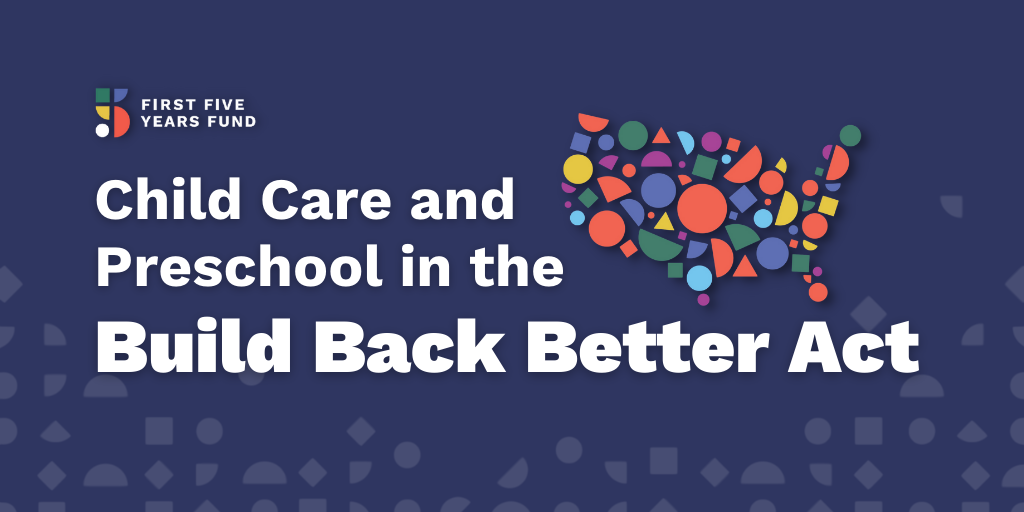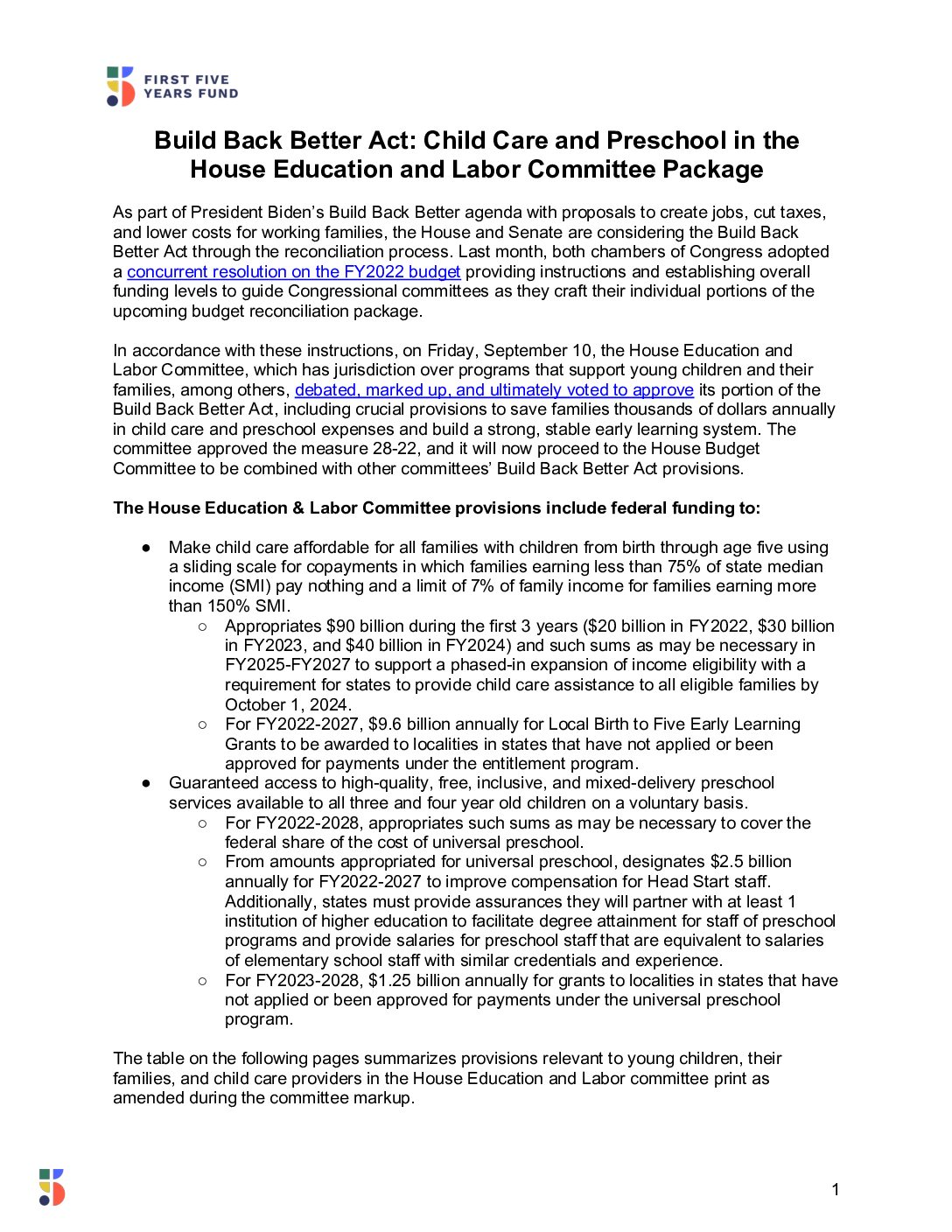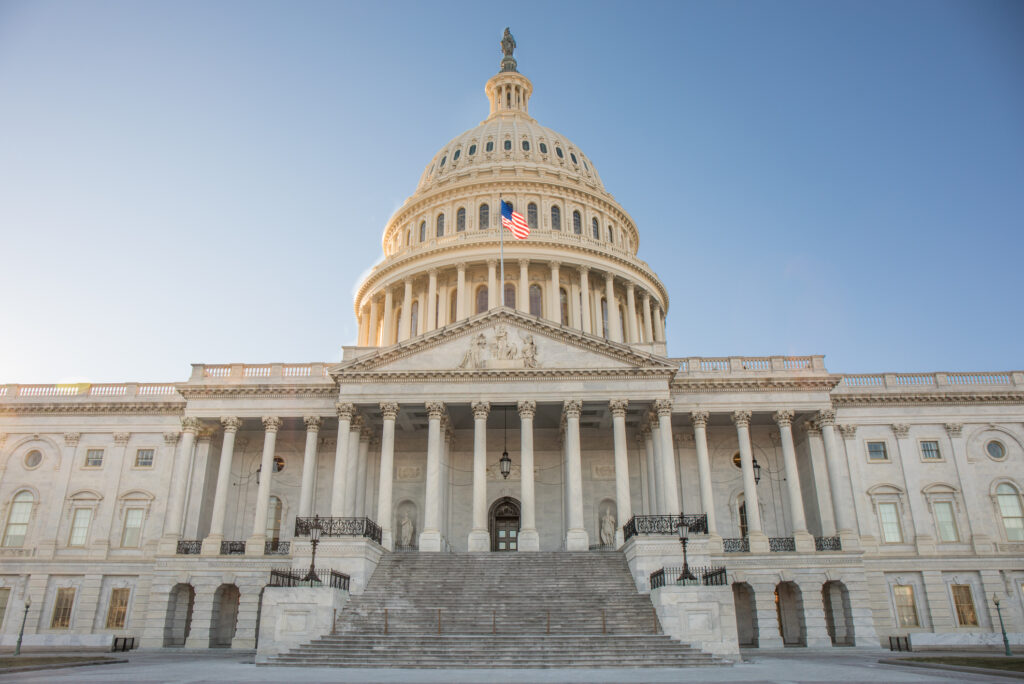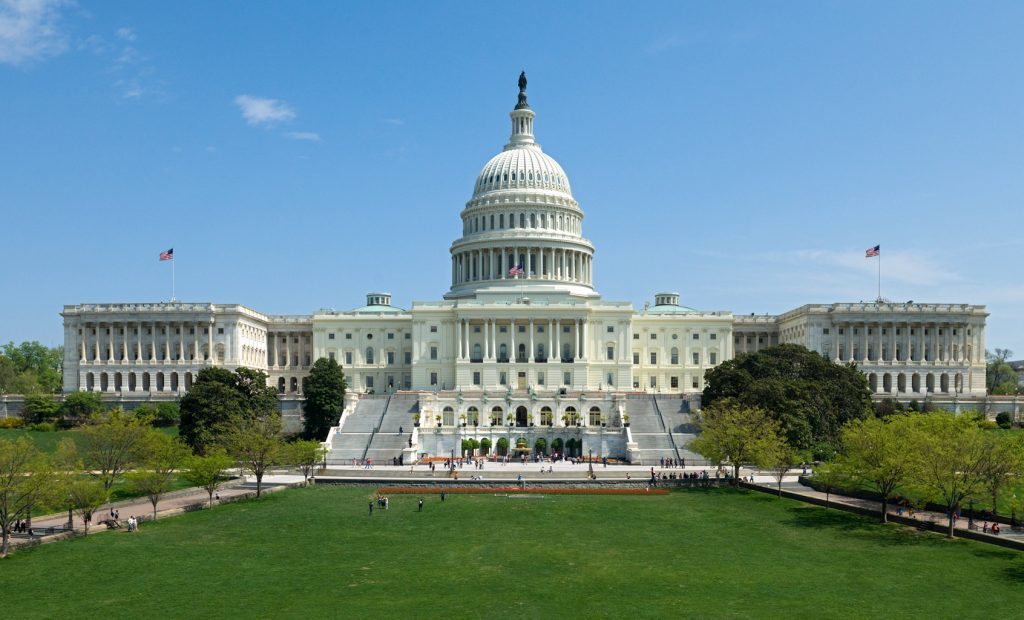Build Back Better Act: Child Care and Preschool in the House Education and Labor Committee Package

As part of President Biden’s Build Back Better agenda with proposals to create jobs, cut taxes, and lower costs for working families, the House and Senate are considering the Build Back Better Act through the reconciliation process. Last month, both chambers of Congress adopted a concurrent resolution on the FY2022 budget providing instructions and establishing overall funding levels to guide Congressional committees as they craft their individual portions of the upcoming budget reconciliation package.
In accordance with these instructions, on Friday, September 10, the House Education and Labor Committee, which has jurisdiction over programs that support young children and their families, among others, debated, marked up, and ultimately voted to approve its portion of the Build Back Better Act, including crucial provisions to save families thousands of dollars annually in child care and preschool expenses and build a strong, stable early learning system. The committee approved the measure 28-22, and it will now proceed to the House Budget Committee to be combined with other committees’ Build Back Better Act provisions.
The House Education & Labor Committee provisions include federal funding to:
- Make child care affordable for all families with children from birth through age five using a sliding scale for copayments in which families earning less than 75% of state median income (SMI) pay nothing and a limit of 7% of family income for families earning more than 150% SMI.
- Appropriates $90 billion during the first 3 years ($20 billion in FY2022, $30 billion in FY2023, and $40 billion in FY2024) and such sums as may be necessary in FY2025-FY2027 to support a phased-in expansion of income eligibility with a requirement for states to provide child care assistance to all eligible families by October 1, 2024.
- For FY2022-2027, $9.6 billion annually for Local Birth to Five Early Learning Grants to be awarded to localities in states that have not applied or been approved for payments under the entitlement program.
- Guaranteed access to high-quality, free, inclusive, and mixed-delivery preschool services available to all three and four year old children on a voluntary basis.
- For FY2022-2028, appropriates such sums as may be necessary to cover the federal share of the cost of universal preschool.
- From amounts appropriated for universal preschool, designates $2.5 billion annually for FY2022-2027 to improve compensation for Head Start staff. Additionally, states must provide assurances they will partner with at least 1 institution of higher education to facilitate degree attainment for staff of preschool programs and provide salaries for preschool staff that are equivalent to salaries of elementary school staff with similar credentials and experience.
- For FY2023-2028, $1.25 billion annually for grants to localities in states that have not applied or been approved for payments under the universal preschool program.
The table below summarizes provisions relevant to young children, their families, and child care providers in the House Education and Labor committee print as amended during the committee markup.
| Child Care and Early Learning Entitlement Program |
|---|
| Sec. 23001(c). Appropriates funds for a new child care and early learning entitlement program for children ages birth through five ($20 billion in FY2022, $30 billion in FY2023, $40 billion in FY2024, and such sums as may be necessary in FY2025-FY2027. Sec. 23001(b)(2)(D), (d)(2). Outlines the phase-in for family eligibility based on state median income (SMI): in FY2022, families earning up to 100% SMI; in FY2023, up to 115% SMI; in FY2024, up to 130% SMI in the third year; and in FY2025-2027, families of any income level. Effective Oct. 1, 2024, states with an approved plan must offer child care assistance to all families who apply and are otherwise eligible. Sec. 23001(g)(1), (h)(1).In FY2022-2024, participating states would receive an allotment based on the Child Care and Development Block Grant (CCDBG) Act formula and would be required to use 50% of funds on expanding access to child care subsidies for children in families with incomes less than 85% SMI and increasing payment rates to support the cost of providing high-quality child care services; 25% on child care supply and quality building activities; and 25% on either subsidy and grant expansion or supply and quality building. Sec. 23001(g)(2). In FY2025-2027, states receive reimbursement from the Federal government for 90% of the cost of child care assistance, at the FMAP rate for child care quality and supply activities, and 50% for administrative expenses. Sec. 23001(i). For FY2022-2027, establishes Local Birth to Five Early Learning Grants to be awarded to localities in States that have not applied or been approved for payments under the entitlement program. Sec. 23001(g)(1)(A)(i)(IV) designates $9.6 billion annually for these purposes. Eligible localities include cities, counties, or other units of general local government, as well as Head Start grantees, with priority given to localities seeking to serve underserved populations. |
| Preschool |
|---|
| Sec. 23002(b). For FY2022-2028, appropriates such sums as may be necessary to provide the federal share of the cost of universal, high-quality, free, inclusive, and mixed delivery preschool services on a voluntary basis. Reserves not less than 4% for payments to Indian Tribes; not more than 0.5% for the territories distributed on the basis of relative need; 0.5% for eligible local entities that serve children in families who are engaged in migrant or seasonal agricultural labor; and $165 million for FY2022, $200 million for FY2023, and no more than 2% for FY2025-2028 for federal activities including administration, monitoring, technical assistance and research. Sec. 23002(c)(2). Requires the Secretary to pay: 100% of State expenditures in FY2022-2024 90% of State expenditures in FY2025 (10% non-Federal share)80% of State expenditures in FY2026 (20% non-Federal share)70% of State expenditures in FY2027 (30% non-Federal share)60% of State expenditures in FY2028 (40% non-Federal share) (Sec. 23002(f) specifies a state’s non-Federal share can include funds spent to expand half-day kindergarten programs to full-day and limits current spending on prekindergarten programs at 50% for these purposes.) Sec. 23002(c)(4). Requires states that receive funding to administer the state’s preschool service program; support a continuous quality improvement system; provide outreach and enrollment support for families of eligible children, including specific outreach to families of underserved populations; support data systems building; support staff of eligible providers in pursuing credentials and degrees, including baccalaureate degrees; support activities that ensure access to inclusive preschool programs for children with disabilities; provide age-appropriate transportation services; and conduct or update the state’s statewide needs assessment. Sec. 23002(c)(6), (7). To be eligible for funding, requires states to submit a plan that must, among other requirements, certify it has developmentally appropriate, evidence-based preschool standards in place and will prioritize high-need communities; support a mixed-delivery preschool system and facilitate the participation of Head Start and other programs offered by eligible providers; ensure children with disabilities have access to and participate in inclusive preschool programs; support continuous quality improvement; and ensure a highly-qualified early childhood workforce. Additionally, the plan must include an assurance that all preschool services will be universally available without additional eligibility requirements; high-quality, free, and inclusive; meet state preschool education standards within 1 year of receiving funding; offer programming that meets the duration requirements of at least 1,020 annual hours; and adopt policies and practices to conduct outreach and provide expedited enrollment, including prioritization, to children experiencing homelessness, children in foster or kinship care, children in families who are engaged in migrant or seasonal agricultural labor, children with disabilities, and dual language learners. Each state plan shall stay in effect for 3 years. Sec. 23002(e). For FY2023-2028, authorizes grants to localities in States that, as of October 1, 2023, have not applied or been approved for payments under the universal preschool program Sec. 23002(b)(2)(F) designates $1.25 billion annually for these purposes. Eligible localities include cities, counties, or other units of general local government, a local educational agency, or a Head Start agency, with priority given to localities serving high-need communities. |
| Expand Supply |
|---|
| Sec. 23001(f)(4)(H). Requires state plans to assure they will prioritize increasing access to and the quality and supply of child care for underserved populations, including, at a minimum, low-income children; children in underserved areas; infants, toddlers, and children with disabilities; children who are dual language learners, and children who receive care during nontraditional hours. |
| Cost of Care and Parent Supports |
|---|
| Sec. 23001(f)(4)(D). Establishes a sliding scale for parent copayments based on a family’s income. The maximum copayment would be 7% of family income for families earning more than 150% of SMI. Families with a child who is eligible for Head Start or with a family income of no more than 75% of SMI would pay no copayment. Sec. 23001(f)(4)(G). Requires states plans to assure that children receiving assistance will receive such assistance for not less than 24 months, and the child’s eligibility determination and redetermination shall be implemented in such a manner that supports child well-being and reduces barriers to enrollment, including continuity of services. Sec. 23001(m)(2). Specifies children under 6 already receiving assistance under CCDBG will automatically be deemed eligible and may continue to use the child care provider of the family’s choice. |
| Quality |
|---|
| Sec. 23001(f)(4)(B). Within 3 years of receiving funds, requires states to create a tiered system for measuring the quality of child care providers that, among other requirements, includes a set of standards for determining a provider’s tier of quality; includes different standards for care during nontraditional hours; and provides sufficient resources and supports for providers not at the highest tier to progress toward higher quality standards. Sec. 23001(f)(4)(C). Requires state plans to certify that within 6 years of enactment their implemented policies and financing practices will ensure all families of eligible children can choose care at the highest quality tier. Sec. 23001(f)(4)(J). Requires states plans to certify that within 3 years of receiving funds it will have licensing standards for child care providers and a pathway to licensure available to and appropriate for providers in a variety of settings, to ensure providers eligible under the CCDBG Act have a pathway to become eligible providers for the entitlement program. (Sec. 23001(b)(2)(E)(ii)specifies CCDBG-eligible providers would be deemed eligible for 3 years after their home state receives funding. |
| Providers and Workforce |
|---|
| Sec. 23001(f)(4)(A). Requires state plans to certify that within 3 years of receiving funds, payment rates for child care assistance will be sufficient to meet the cost of child care based on an approved cost estimation model or cost study and correspond to differences in quality based on the state’s tiered system for measuring quality. Specifies the cost estimation model or cost study must include estimates for providers at each tier of the state’s tiered system for measuring quality and variations in the cost of child care services by geographic area, type of provider, and age of child, and the additional costs associated with providing inclusive child care services. Additionally, states must certify payment rates enable providers not at the highest tier to increase quality and ensure that wages for staff of child care providers, at a minimum, provide a living wage, are equivalent to wages for elementary educators with similar credentials and experience, and are adjusted annually for cost of living increases. Sec. 23001(f)(4)(D). Requires state plans to certify that within 3 years of receiving funds, they will have a wage ladder for staff that meets the requirements outlined above. Sec. 23002(a)(6). Defines “eligible providers” for the purposes of universal preschool as local educational agencies that are licensed by the State or meet comparable health and safety standards; Head Start agencies; a licensed center-based provider, family child care provider, or community- or neighborhood-based network of licensed family child care providers; or a consortium of such entities. Sec 23002(d). Specifies subgrants or contracts with preschool providers will be for at least 3 years; requires the amount to be sufficient to enable providers to meet requirements and reflect variations in the cost of services by geographic area, type of provider, and age of child, and the additional costs associated with providing inclusive child care services; and requires enhanced payments to providers offering comprehensive services, health and development screenings, and service referrals for children and families they serve. Priority would be given to programs in high-need communities. Sec. 23002(c)(6)(J), (K)(v)-(vi). Requires state plans to provide assurances that it will: Partner with at least 1 institution of higher education to facilitate degree attainment for staff of preschool programs; Provide salaries and set salary schedules for preschool staff that are equivalent to salaries of elementary school staff with similar credentials and experience; and At a minimum, provide a living wage for all staff of such providers; andRequire educational qualifications for teachers in the preschool program including, at a minimum, requiring lead teachers to have a baccalaureate degree in early childhood education or a related field within 7 years of enactment of this Act (excluding individuals employed by an eligible child care provider or early education program for a cumulative 3 of the last 5 years from the date of enactment and with necessary content knowledge skills). Sec. 23002(b)(2)(E). From amounts appropriated for universal preschool, designates $2.5 billion annually for FY2022-2027 to improve compensation for Head Start staff. |
Subscribe to FFYF First Look
Every morning, FFYF reports on the latest child care & early learning news from across the country. Subscribe and take 5 minutes to know what's happening in early childhood education.




